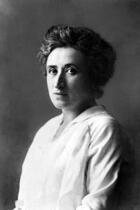
Rosa Luxemburg (Zamość, 1871-Berlin, 1919), a revolutionary Marxist political theorist and committed to democracy, was one of the most prominent figures on the left of the early 20th century.
Born into a Polish family of Jewish origin, she studied law and political economy in Zurich and played a leading role in the Polish Social Democratic Party (SDKPIL). In 1898 she obtained German nationality and moved to Berlin, where she joined the Social Democratic Party of Germany (SPD) and actively participated in the debate on the future of socialism, defending, together with Kautsky, Marxist orthodoxy against Bernstein's revisionism. . Likewise, she advocated a pacifist internationalism and led the opposition to the First World War, which is why she was arrested and distanced herself from the official line of the Social Democratic Party, which had supported Germany's entry into the war. She along with Karl Liebknecht she created the split of the party that would become the Spartacist League and three years later the German Communist Party (KDP). After the frustrated revolutionary uprising of January 1919, which she considered a mistake but ended up supporting, she was assassinated by paramilitary forces.
Among her works are Reform or Revolution (1900), Mass Strike, Party and Trade Unions (1906) and The Accumulation of Capital (1913).






